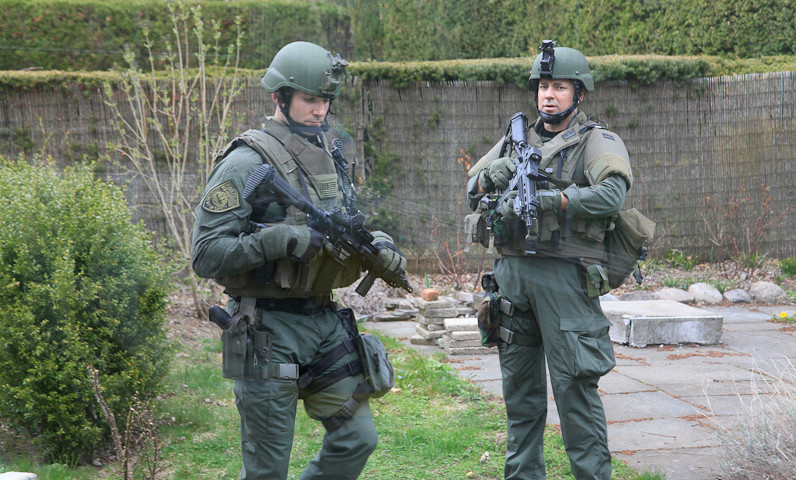In an article in Salon, two professors, Falguni A. Sheth and Robert E. Prasch, argue that the events surrounding the Boston Marathon bombing are not a vindication of American counterterrorism policy. Their argument is meant to counter the reaction, from people all over the political spectrum, that the efforts of law enforcement represent a successful demonstration of the policies put in place after 9/11.
The authors note, correctly, that most of the breaks in this case happened by accident. The initial police response that flushed out the Tsarnaev brothers was caused by a robbery of a 7-Eleven. This robbery, despite earlier reporting to the contrary, was not perpetrated by the brothers and not related to any of the events that followed. The final capture of Dzhokhar Tsarnaev stemmed from an observant homeowner who noticed the tarp on his boat ajar, and some blood on the boat.
The authors make good points, but I think their argument is too simplistic. I should note that, growing up in New England and living for several years in Boston, I am not an unbiased commentator. It’s hard not to be swept up in the good feelings now being directed at the law enforcement community after the end to this ordeal.
This article lumps together efforts aimed at preventing terrorism, and the response to terrorist acts. And while all these policies may be labeled as “counterterrorism,” I think they should be discussed separately.
I have already written on this blog about my grave reservations to many of the counterterrorism policies put in place after 9/11, including domestic wiretapping, holding enemy combatants at Guantanamo Bay, and the use of drones. While some of these policies have been scaled back under the Obama administration, many have not. Given the country’s fear after 9/11, I think the rationale behind many of these policies is understandable, but unfortunately President Obama has not had to courage to dismantle some of this counterterrorism apparatus.
The response to the marathon bombing demonstrates that some things have changed for the better since 9/11. Multiple law enforcement agencies on both the federal and local level were able to work together. These agencies seemed incredibly well equipped, especially when it came to explosive ordnance disposal. There seemed to be plans in place to both investigate the bombing, and to organize a manhunt for the suspects. Public officials and law enforcement officers briefed the public regularly, and rarely did events seem to be spiraling out of control. And despite calls from Lindsey Graham and others, it does not appear that Dzhokhar Tsarnaev, a US citizen, will be treated as an enemy combatant.
The authors write about the militarization of law enforcement, and I too was struck by the sheer number of heavily armed officers that turned out to comb Watertown for the suspects. But if Professors Sheth and Prasch argue against invasive surveillance efforts, there has to be an expectation that there will be a greater risk of terrorist acts. It may seem callous, but the authors seem to believe that this increased risk is the price we pay for our liberties. I’m inclined to agree with them. But given this risk (not to mention the country’s rabid gun culture and Congress’s inability to pass gun control) I want law enforcement prepared for any eventuality. The fact that the officers took one suspect alive (and tried to take the other one alive as well) suggests that militarization can still be combined with traditional law enforcement restraint.
The author’s also criticize the decision to lock down Boston on Friday. The authors are more concerned about the lockdown’s impact on civil liberties, although some commentators are distressed about the estimated $330 million loss to Boston’s economy. As my fellow columnist Graham Sheridan has written about, it’s easy to scream “tyranny!” when you disagree with a policy. We’re far more likely to see benevolence and a concern for the public good behind policies we support. And while shutting down a major American city was unprecedented, given the circumstances I think the governor and the mayor acted responsibly. The fact that Bostonians complied with this voluntary request, en masse, suggests they thought it was a good idea too.
In my initial response to the bombings, I said I hoped these events wouldn’t change the country like 9/11 changed the country. So far, I have been gladdened by the response, which has mostly focused on the victims and the first responders, and on a desire not to see Boston and the marathon change. I think this country is still dodging an important conversation about how we fight terrorism. I share concerns, expressed by Slate’s Emily Bazelon and others, that the decision not to read Dzhokhar Tsarnaev his Miranda rights represents a slippery slope and a troubling precedent. But law enforcement acted swiftly and successfully in this crisis, and castigating their efforts to make a larger point about counterterrorism does them a disservice.

John Cassidy has a well-circulated article recently, where he discusses the cultural weight we assign to “weapons of mass destruction” (as a euphemism for terrorism) and assault weapons. His point, basically, is that had the Tsarnaev brothers used an AR-15—-and undoubtedly killed more people in the process—it would have been treated as a less egregious crime.
His point intersects with your article when it comes to the cultural and political price we’re willing to pay to stop potential crimes. You write that you’re “inclined to agree” with the authors’ notion that we might be better off with an increased risk as the price for knowing we live in a free, and sometimes dangerous, country.
But isn’t that an identical argument to the one levied by the NRA? That we can’t give up freedom for the naive sensation of “security”?